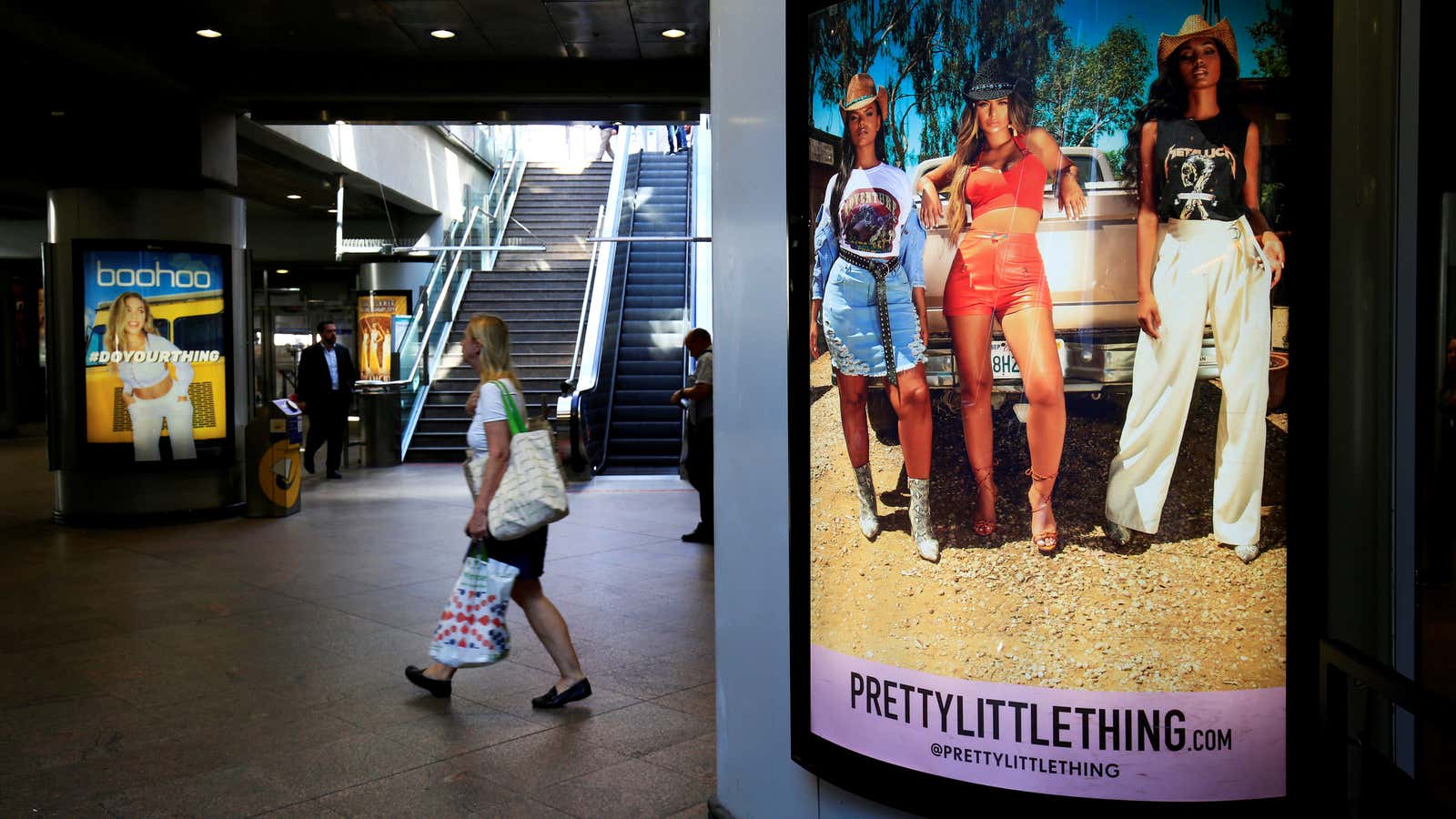Boohoo, a UK fast-fashion retailer, is under pressure after damning reports emerged about labor conditions at factories in Leicester said to be making clothes for the company.
An undercover investigation by The Sunday Times alleged that workers at one factory contracted by Boohoo to produce its clothes earned as little as £3.50 (about $4.40) an hour, despite a national minimum wage of £8.72 for those 25 and older, and had little protective equipment at a time when Leicester is struggling to contain Covid-19. It followed on a June report (pdf) from watchdog group Labour Behind the Label that said Leicester factories producing for Boohoo and others continued working at full capacity, often without adequate safety protocols, through the city’s coronavirus lockdown in April. Boohoo has called the reports inaccurate and emphasized it does not tolerate violations of its supplier code of conduct, though it has cut ties with two suppliers and commissioned an independent review of its supply chain.
The news produced a swift reaction. Boohoo’s share price initially fell more than 40% before rebounding slightly, and retailers including Amazon, ASOS, and Next have pulled clothes from Boohoo and its brands from sale. It’s a significant response, particularly given that such allegations are hardly new—even to Boohoo—and have plagued the fashion industry for years.
Some experts argue such rights violations, wherever they occur, are an inevitable consequence of the low-cost, high-volume business model underlying much of fashion today, particularly fast fashion. A report last year by the Ethical Trading Initiative, a collective of watchdogs, trade unions, retailers, and other stakeholders, noted fashion companies “have become adept at dissecting the supply chain and looking for pockets of ‘value’ that can be ring-fenced and negotiated downwards.” It creates pressure on suppliers to offer lower prices than competitors, often under deadlines they may struggle to meet, leading to labor violations and practices such as outsourcing to unregulated factories.
Most of the time these issues have arisen at Asian factories producing for international fashion companies. Reports of incredibly low pay, unsafe working conditions, and other labor abuses have regularly surfaced for years in countries such as Bangladesh, India, and Myanmar.
But they’ve popped up in places such as the US and UK, in particular in Leicester, where many garment workers are South Asian immigrants. In 2014, the University of Leicester found “endemic” problems (pdf) in the city’s garment industry, the most widespread being illegally low wages. In 2017, a television news investigation discovered UK garment factories paying workers between £3 and £3.50 an hour to produce clothes for a number of companies, including Boohoo, Missguided, and River Island. A 2018 Financial Times story brought up the issue again, leading to a grilling of executives from Boohoo and other companies by Britain’s parliament.
Investors are aware of these problems. One of Boohoo’s top-25 largest shareholders told the Financial Times, “this kind of supply chain issue is not new and one we have identified and discussed as a significant business risk for Boohoo and many other retailers in the fast-fashion industry.” What may be different this time is Boohoo is also accused of enabling the spread of Covid-19 in the city.
In a statement, Boohoo said the Sunday Times investigation had multiple inaccuracies, contending that the clothes featured were actually made in Morocco by a different supplier, which only sent them to the Leicester factory to be repackaged. Of the Labour Behind the Label report, the company maintained that it adhered to the guidance of the UK government. “At no point has this guidance required any on-line business or factory to close,” it said. “It is therefore wrong to suggest that we were flouting the rules by continuing to trade before the 22nd April.”
Whether the reports will prompt any change is debatable. Shoppers have expressed outrage on social media, but in the past they’ve tended to move on quickly. One major investor in Boohoo told the FT it was increasing its stake.
